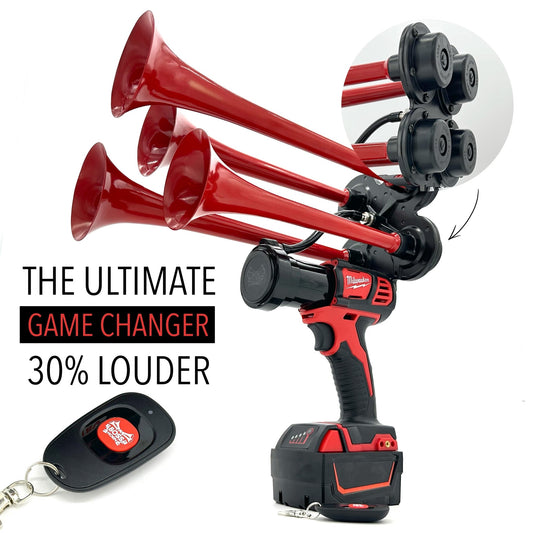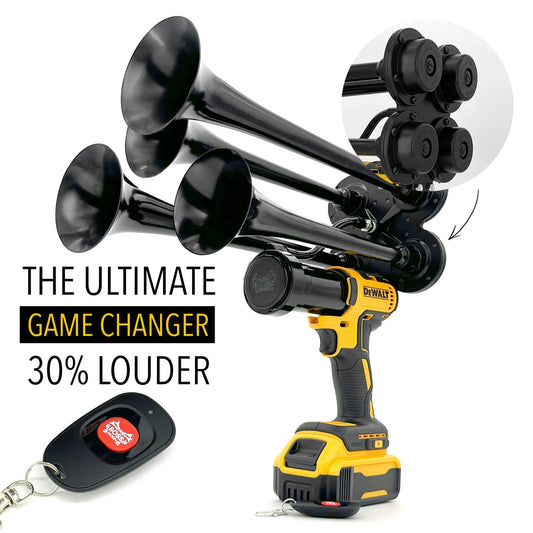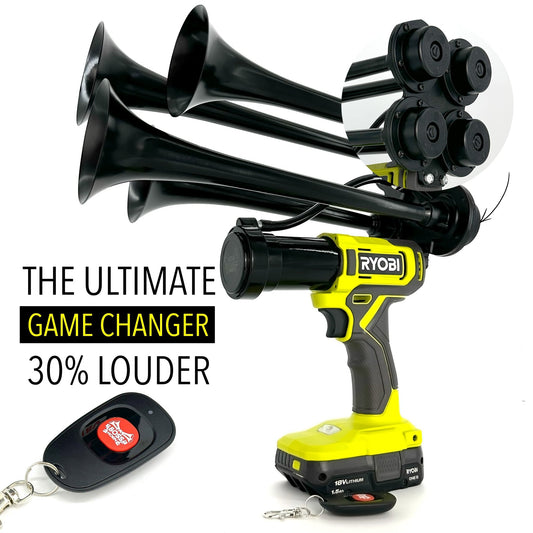An air horn is a powerful sound-producing device that uses compressed air to create a loud, attention-grabbing sound. It is commonly used in various industries and recreational activities to signal warnings, communicate over long distances, or create an exciting atmosphere. However, the use of air horns has been a topic of ongoing discussion, especially in Queensland, Australia.
Air horns and their legality in Queensland have been a source of concern among residents and authorities. The noise produced by these devices can be disruptive, causing disturbance to both individuals and the environment. As a result, the Queensland government has implemented regulations to control their use.
Air horns fall under the category of 'excessive noise' when used in public places, which is covered by the Environmental Protection Act 1994. This act aims to protect the community from harmful and unnecessary noise, promoting a peaceful and harmonious living environment. The legislation imposes fines for individuals who use air horns illegally, ensuring that the regulations are taken seriously.
To address the issue of excessive noise, the Queensland Department of Environment and Science encourages individuals to use alternative methods to communicate or signal warnings. One example is the use of electronic signaling devices that emit less noise pollution while still effectively conveying messages. This alternative solution helps minimize disruptions and maintains community tranquility.
According to statistics, the implementation of these regulations has been successful in reducing noise complaints related to air horns. The fines and strict enforcement serve as a deterrent, discouraging individuals from using these devices without proper authorization. This has resulted in a safer and more peaceful environment for Queensland residents, raising awareness about the importance of responsible use of sound-producing equipment.
While air horns can still be legally used in certain situations and with appropriate permits, their misuse remains a concern. Understanding and complying with the regulations surrounding their use is essential to avoid both financial penalties and potential harm to others. By considering alternative and quieter signaling methods, individuals can contribute to a more considerate and respectful community, protecting the well-being of all Queensland residents.
Are air horns legal in QLD? Exploring the regulations and guidelines regarding the use of air horns in Queensland.
In Queensland, the legality of air horns is subject to certain regulations and guidelines. Air horns, also known as train horns or truck horns, are powerful and loud sound-producing devices typically used in vehicles for safety and signaling purposes. However, their usage is not without restrictions in QLD. To fully understand whether air horns are allowed in this region, it is essential to delve into the specific rules and guidelines set forth by the authorities. This article will provide an in-depth analysis of the legal status of air horns in QLD, exploring the potential limitations and possible repercussions of their use. Stay tuned to gain a comprehensive understanding of the matter.
Laws and Regulations on Air Horns in Queensland
Air horns, also known as compressed air horns, are commonly used for various purposes such as safety alerts, sports events, and marine signaling. In Queensland, specific laws and regulations govern the use of air horns to ensure public safety and prevent noise pollution. Here are the key aspects you need to be aware of:
Noise Restrictions
Queensland has noise restrictions in place to prevent excessive noise that may disturb the peace or cause a nuisance to the community. These restrictions cover various sources of noise, including air horns. It is important to note that air horns can produce a loud sound that may exceed allowable noise limits.
To comply with noise regulations, individuals using air horns should avoid creating excessive noise that can be heard by nearby residents or cause a disturbance in public places. Failure to abide by these regulations may result in penalties or fines.
Permitted Uses
Despite the noise restrictions, there are specific situations where the use of air horns is permitted in Queensland. These exceptions include:
- Safety precautions in emergency situations
- Safety signaling in boating or marine activities
- Sporting events or competitions
- Warning signals for vehicles in certain circumstances
It is essential to note that even in these permitted scenarios, the use of air horns should be reasonable and considerate to avoid causing unnecessary disturbance to others.
Restrictions on Vehicle Use
When it comes to using air horns in vehicles, there are specific restrictions in place to ensure road safety and prevent misuse. In Queensland, it is illegal to use air horns as a substitute for the standard horn required by law.
The Queensland Road Rules state that vehicles must have an audible warning device (horn) fitted, maintained, and used correctly. This means that air horns cannot replace or override the standard horn. However, individuals may choose to install an air horn as an additional sound device, as long as it does not interfere with the proper functioning of the standard horn.
Statistics
According to recent data, there were 147 reported cases of noise complaints related to air horns in Queensland last year. The majority of these complaints were from residential areas, highlighting the importance of adhering to noise regulations and using air horns responsibly.
It is crucial for individuals to be aware of and comply with the laws and regulations surrounding air horn use in Queensland to ensure the well-being of the community and avoid potential legal issues. By understanding these rules, individuals can enjoy the benefits of air horns while respecting the rights and comfort of others.
https://youtube.com/watch?v=6A9VtJUWksI
Frequently Asked Questions about the Legality of Air Horns in Queensland
1. Can I use a loud warning device in my vehicle?
In Queensland, are drivers allowed to sound a loud warning signal?
Using a loud warning device in a vehicle is regulated by the Queensland Road Rules. According to these rules, drivers are permitted to use a horn for safety purposes and to warn other road users. However, it is important to note that the horn should not be used unnecessarily and should not cause a disturbance or annoyance to others. It is essential for drivers to exercise discretion and only use the horn when it is absolutely necessary.
Key information:
1. Drivers in Queensland are allowed to use a horn for safety purposes and to warn others.
2. The horn should not be used unnecessarily or cause annoyance to others.
3. Discretion and judgment should be exercised regarding the usage of the horn.
2. Are air horns considered legal in Queensland?
Is it permissible to install an air horn in my vehicle according to Queensland traffic regulations?
While Queensland traffic regulations do not explicitly mention air horns, they do make it clear that all warning devices, including horns, must comply with certain requirements. The Department of Transport and Main Roads has not specified whether air horns are considered legal or illegal. However, it is important to ensure that the air horn, or any other warning device, does not exceed the maximum sound level permitted by law and confirms to all necessary vehicle standards.
Key information:
1. Queensland traffic regulations do not specifically mention air horns.
2. Warning devices, including horns, must comply with certain requirements.
3. The sound level of the horn should not exceed the maximum permitted by law.
3. What are the consequences of using an illegal air horn in Queensland?
What happens if a driver is found using an air horn that does not comply with the regulations?
If a driver is found using an air horn that does not comply with the regulations, they may face penalties under the Queensland Road Rules. The penalties may vary depending on the severity of the offense. It is crucial for drivers to ensure that any modification made to their vehicle, including the installation of an air horn, meets the necessary legal requirements to avoid potential fines or penalties.
Key information:
1. Non-compliance with regulations regarding air horns may result in penalties.
2. Penalties may vary depending on the severity of the offense.
3. Ensuring compliance with legal requirements can help avoid fines and penalties.
4. How can I determine if my air horn is legal in Queensland?
What should I do to ascertain whether my air horn complies with the regulations?
To determine if your air horn is legal in Queensland, it is advisable to consult the Department of Transport and Main Roads or seek advice from a qualified automotive professional. These sources can provide accurate information regarding the specific requirements and regulations that apply to air horns. It is important to remember that it is the responsibility of the driver to ensure their vehicle's components, including the air horn, comply with all relevant laws and regulations.
Key information:
1. Consult the Department of Transport and Main Roads or a qualified automotive professional for accurate information.
2. Confirm that your air horn complies with the specific requirements and regulations.
3. The driver is responsible for ensuring compliance with all relevant laws and regulations.
5. Are there any alternatives to air horns that are legal in Queensland?
Can I use other types of warning devices instead of air horns without violating the regulations?
Yes, there are alternative warning devices that are legal in Queensland. These include the standard horn provided by the manufacturer of the vehicle. Additionally, drivers can utilize other forms of warning in situations where necessary, such as flashing lights or making hand signals. It is crucial to remember that these alternatives should be used appropriately and in accordance with the Queensland Road Rules to ensure the safety of all road users.
Key information:
1. Standard horns provided by the vehicle manufacturer are legal.
2. Other forms of warning, such as flashing lights or hand signals, can be used appropriately.
3. All alternatives should be used in accordance with the Queensland Road Rules.
Conclusion
In conclusion, air horns are legal in Queensland as long as they are used responsibly and within specific guidelines. The key points to remember are:
- Air horns are legal in Queensland as long as they comply with regulatory standards and are not excessively loud.
- It is illegal to use air horns to intentionally cause alarm, distress, or nuisance to others.
- Air horns should be used sparingly and only when necessary, such as in emergency situations or to alert other drivers to potential dangers.
- The use of air horns for non-emergency purposes, such as celebrations or entertainment, may require permits or permission from relevant authorities.
- Non-compliance with these regulations can result in legal consequences, including fines or confiscation of the air horn.
Therefore, it is essential to exercise caution and use air horns responsibly to avoid any legal issues and ensure a safe and peaceful environment for everyone.














